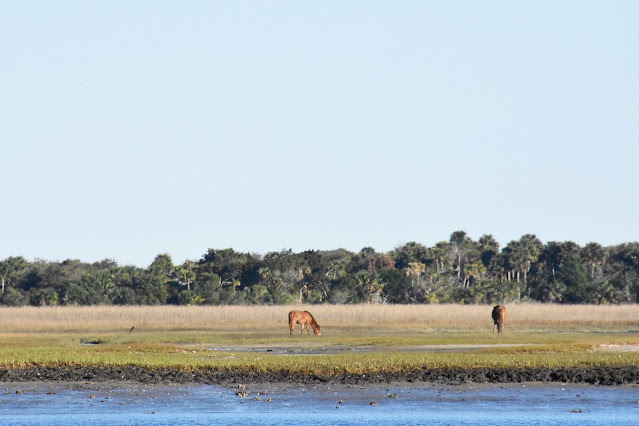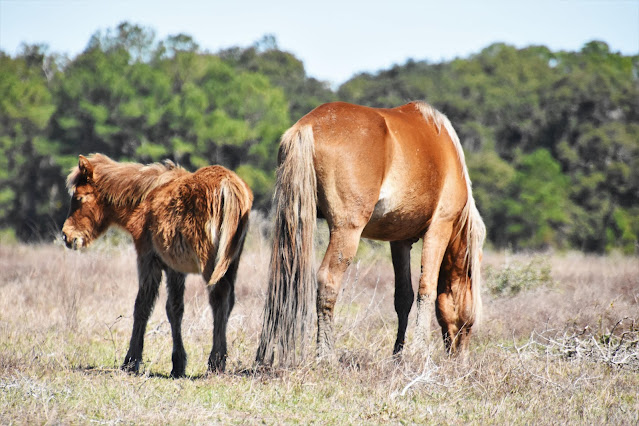Save Cumberland Island’s Wild Horses
This is an old website page from 2023. To find updated information, read our brand new field guide to the Cumberland Island Wild Horses.
Wild horses grazing on Cumberland Island.
Unknown to many, wild horses inhabit an island in southeast Georgia called Cumberland Island. This lush, beautiful island is over 36,000 acres and hosts a variety of wildlife. Between 150-170 horses have roamed freely on Cumberland Island since the 1700s.
These wild horses have become the focus of people and news outlets across the state of Georgia. The National Park Service (NPS) doesn’t want to manage the horses, but a recent lawsuit taken out against the NPS seeks to force them into managing the horses by causing them to die out.
However, I believe that the wild horses should remain on Cumberland and should be managed minimally to ensure that the population is stable and healthy.
Why do the horses need help?
Georgia is very deficient in the mineral Selenium. Selenium is a critical mineral for pregnant and lactating mares. This could explain why most of the mares are in poor condition. Selenium aids in digestion, which could mean that because of the lack of Selenium, the horses are not getting all the nutrients from the forage they are consuming. That is likely a reason why they are so thin.
Another mineral that would benefit the horses is Calcium. I inspected several piles of manure and noticed that the horses are not chewing their food thoroughly. The horses’ teeth need to be stronger.
According to FeedXL, four symptoms of horses that have mineral deficiencies are:
1. Weight loss or inability to gain weight
2. Low energy or reaching fatigue earlier than they should for their level of fitness
3. Gut issues, including poor digestion, poor absorption, and an increased risk of gastric ulcers
4. Uterine artery rupture in foaling mares
These symptoms describe the Cumberland Horses perfectly. I believe that the Cumberland Island Horses’ main issue is a lack of minerals, not a lack of forage.
A yearling during my May 2023 trip to the island.
Another obvious sign of mineral deficiencies in the horses is shown by the black horses’ coats being bleached, giving them a brownish tint. That means that they are lacking in Copper and Zinc. (Balanced Equine)
The horses should be brought minerals as soon as possible (which I am willing to do). However, once the horses are consuming the minerals and benefitting from them, they will begin to live longer and have a higher survival rate. At that point, it may be necessary to use some amount of management (such as PZP, a safe and effective fertility control vaccine), which would ensure that the population stays at a healthy level.
The horses don't have any natural predators on the island, unlike the wild horses living in the West, which would keep the population at bay. The lack of predators creates a need for humans to manage the population so that the horse population is stabilized and healthy.
A skinny, pregnant mare walks down the path with what is likely two of her offspring.
Why should the horses stay on the island?
It is becoming more popular to believe that grazing by large animals, like horses, is beneficial to the ecosystem and enhances biological diversity. A study conducted in Sweden showed that the horses' grazing "increased the diversity of pasture nutrient content" and that "energy and protein concentrations and grass availability increased in areas grazed by horses, but decreased where grass was mown". A study by Rutgers University showed that - when properly managed - horses' manure can improve soil quality. The study also said, "The organic matter present in manure can improve both tilth and water holding capacity of the soil".
Some people claim that the wild horses are destroying the dunes on the island. If that were true, why would the turtle nest count continue to rise since “turtles are indicator species or sentinel species, which means that their abundance, distribution, and health in the ecosystem are reflective of environmental conditions”? Cumberland Island consistently has the most sea turtle nests of any beach in Georgia (NPS).
People love the horses and will visit the island just to see them. They have been part of the island for many years! The horses' presence there is the only reason why I have been to Cumberland Island and will continue to go.
Additionally, with the attempts made over the past several years to develop Cumberland Island, removing the horses could make it easier for the government to allow building on the island.
Two stallions in good body condition graze near the Dungeness Ruins.
What is Mustang Mission doing to help the horses?
I want to save the Cumberland Island wild horse population from being allowed to die off, but at the same time, save the mares from starvation. That is why I am creating a campaign to "Save the Cumberland Island Wild Horses"! I am seeking to work with the NPS to create a better future for the horses of Cumberland Island. I will be putting a lot of time and effort into making the public aware of the plans for the horses and how they can help. I will continue to do extensive research and visit Cumberland Island regularly, as well as continue discussing with professionals how to solve the problem and create a sustainable solution.
What can you do to help the horses?
Please pray for these horses and sign and share our petition! That would be the biggest help to us and the Cumberland Island Horses! You can support our campaign by purchasing t-shirts. Also, you must be educated about what's going on, so you can educate others! Subscribe to our newsletter for more information and read the comprehensive document below about Mustang Mission's position on the Cumberland Island Wild Horse situation.
----------
Gallery
All photos copyright of Mustang Mission
The famed Dungeness Ruins on Cumberland Island.
A wild horse grazes beneath the lush maritime forest canopy.
















